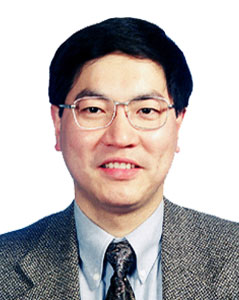 SHEN Dingli(Retired)
SHEN Dingli(Retired)
Professor, Ph.D., Fudan University
Center for American Studies, Institute of International Studies, Fudan University
Research Interests: China-U.S. Relations; Nuclear Arms Control and Nonproliferation; Regional Security; Export Control; China’ s Foreign and Defense Policy; Nuclear Weapons Policy of China and the U.S.
Email: dlshen@fudan.ac.cn
Shen Dingli, a physicist by training, is a professor of international relations at Fudan University.He is the founder and director of China's first non-government-based Program on Arms Control and Regional Security at Fudan University.
Dr. Shen teaches at Fudan University graduate courses “Nonproliferation andInternational Security”, “Science/Technology and National Security”, as well asdoctoral courses “International Security: Theory and Practice”, and “RegionalSecurity”. He co-teaches undergraduate courses, “China and the World”, and “ContemporaryAmerica”, at Fudan. He has taught China’s foreign policies at Colorado Collegesince 2002.
His research areas cover China-U.S. security relationship, nuclear arms control and disarmament, nuclear weapons policy of the United States and China, regional nonproliferation issues concerning South Asia, Northeast Asia and Middle East, test ban, missile defense, export control, as well as China’s foreign and defense policies. He has co-edited “China’s Development Report”, “China and South Asian Relations in the 1990s”, “Conservatism and American Foreign Policy”, “Realism and U.S. Foreign Policy” and published over 500 articles and papers, 1/2 of which abroad in a dozen foreign languages. In addition, he has published over 20 papers in physics in China and abroad.
Asa key independent academic voice in China in arms control and nonproliferation, Dr. Shen has been invited to numerous conferences at home and abroad. Also, among three dozens of international conferences he has organized, The Shanghai Dialogue (or Shanghai Initiative), ahigh level track-II series of meetings since 1994 involving China, India, Pakistan and the United States, has been viewed as one of the most important multilateral unofficial talks on nuclear arms control and nonproliferation involving these countries.
Dr.Shen is a member of IISS and a number of other international organizations. He is on the editorial board of Contemporary Asia-Pacific Studies (China), South Asia Studies (China), Fudan Journal Social Sciences Edition (China), Journal of Contemporary China (U.S.), Journal of East Asian Studies (ROK/Japan/Taiwan), IRI Journal (ROK), INESAP Information Bulletin (Germany), and Nonproliferation Literature Review (U.S.), as well as on the international advisory board of Regional Studies (Pakistan). Dr. Shen also provides consulting service to China’s MFA, MOFCOM etc. In January 2002 he was invited by Secretary General of the United Nations Kofi Annan to advise SG of the strategy panning for his second term, as the sole Chinese out of 40 persons chosen worldwide.
Dr.Shen was born in 1961. He received his Ph.D. in physics in 1989 from Fudan University and did his post-doc in armscontrol at Princeton University from 1989-1991.In 1997, he was awarded an Eisenhower Fellowship. From 1997-2000, he served as Fudan University’s Director of Office of International Programs and Deputy Director of Office of Development and Research.
Projects
American's National Security Strategy in the Post-antiterrorism Era
Arms Control and American National Security Strategy
Books(Monograph and Translation)
Financial Crisisand Asia's International Relations
Economic Transformation and International Order in Asia
Geoecnomics andpolitics in Asia
American Studies and Me
Conservatism and American Foreign Policy (thesis collection)
Papers
Six Party Talks and the Denuclearization of the Korean Peninsula
Revitalizing the Prague Agenda
Space Security: China's Perspectives
Toward a Nuclear Weapons Free World: a Chinese Perspective
China-U.S. Cooperation in Space
Cooperative Denuclearization toward North Korea
Global USA - A Chinese perspective
China-India Relations: Quest for Strategic Partnership
Cooperative Denuclearization toward North Korea
Global and Regional Hierarchies in Power Transition: China’s Peaceful Rise
Sino-US Relations and Sino-Japanese Relations in Northeast Asia
Future Sino-American Relations: Mutual Accommadation
The Double-Circle Strategy of China's Regional Diplomacy
Why China sees the EU as a counterweight to America
Nuclear Issues in Asia and the World
Can Sanctions Stop Proliferation?
China's Defensive Military Strategy: the Space Question
Nuclear Proliferation, International Security
Review of America's Asia Strategy
A Review of the U.S.'s Strategy towards Asia
2007: Nonproliferation and China-U.S. Relationship
Strengthening the Sino-U.S. Strategic Dialogue
U.S.-India Nuclear Agreement and Its Reflection
PRC Scholar Analyzes Implications of a DPRK Nuclear Test
North Korea's Strategic Significance to China
India, Chin China
Pyongyang scommette sulla newtralità di Pechino
China's Perspectives on WMD Proliferation, Arms Control, Disarmament, and Related Threats from Non-State Actors
Nuclear Deterrence in the 21th Century
Emergence d'une diplomatie active
Iran's Nuclear Ambitions Test China's Wisdom
The Impact of US Military-Industrial Complex on American Arms Control Policy
Can Alliances Combat Contemporary Threats?
The Theme of NewEmpire and Its Insufficiency
Terrorism in the Context of Terrifying Language
China's Evaluation of the Adjustment to US Security Policy Since September 11, 2001
China's Foreign Policy: Cases of Iraq and North Korea
The Theme of New Empire and Its Insufficiency
Nonproliferation and WMD Terrorism: Addressing Terrorist Threat through Cooperation
NATO's New Strategy: Tool of US New Interference
Sino-US Relations in the 21st Century
US New Military Strategic Review
China's Energy Problem and Alternative Solutions
Nuclear Equilibrium in Asia
On International Relations in the Nuclear Age
The Present and Future of Eastnorth Asia's Regional Security
Clinton Administration's Possible Influence to China's Nuclear Test
Policy Papers
Sino-American-Taiwan Relations
American Space Strategy and Its Impacts on China's Security
The Adjustmentand Correspondent Measures of Technology Introduction Pattern in Shanghai Underthe Setting of China's Accession to the WTO






